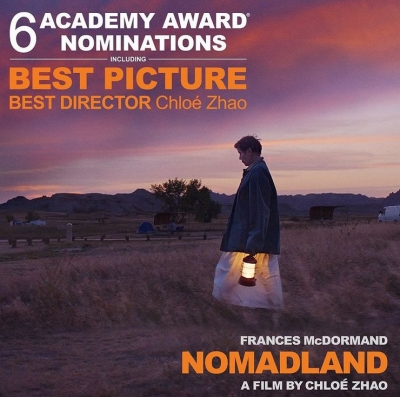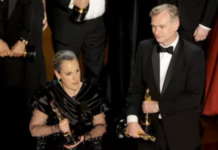Nomadland; Cast: Frances McDormand, David Strathairn, Linda May, Swankie; Direction: Chloe Zhao; Rating: * * * * (four stars)
BY VINAYAK CHAKRAVORTY
Silences can overwhelm, too — watch Frances McDormand in “Nomadland” and you know. You’ve seen her ace the art of minimalism as an actor in numerous roles, notably “Fargo”, “North Country” or “Three Billboards Outside Ebbing, Missouri”. In “Nomadland”, her shot at a third Oscar as Best Actress, McDormand turns restraint into a fine art.
It is easy to fall in love with indie helmer Chloe Zhao’s new film for the consummate performance that McDormand gives, but “Nomadland” has other aspects that resonate in your mind. It is a quintessential American film that leaves a universal impact with what it conveys. There is a magical quality about Zhao’s storytelling that impacts quietly, as a nuanced play of emotions takes its time to unravel. Offbeat in idiom, the film remains mainstream in its dissection of despair and hope.
Zhao’s screenplay draws from American journalist Jessica Bruder’s work “Nomadland: Surviving America In The Twenty-First Century” to set up a narrative. The backdrop is the small town of Empire in Nevada, built almost entirely around the gypsum plant that sustains the local population. When the plant shuts down, the town begins to disappear — so much so, within six months its zip code actually ceases to exist.
The story moves with Fern (McDormand) who is rendered jobless when the gypsum plant shuts down, following which her husband dies. She sells her property, buys a van and hits the road.
Fern, who prefers being described as “houseless” and not “homeless”, becomes one of the United States’ floating populace that is constantly on the move in search of work. She manages to get a seasonal job at an Amazon Fulfillment Center, but that is obviously no permanent solution.
Fern’s nomadic lifestyle may seem like an alien concept outside the US, not so the story of Empire. Modern life is dependent on industry. In turn, in the post-recession world, shutdown of industry has led to loss of habitat and lives all over.
Zhao’s narrative, however, is not all about painting a bleak portrait, using that reality as a backdrop. The transient world of nomads, Fern will gradually learn, is one of survival and self-sufficiency. To drive home the point, the film introduces celebrated van-dweller Bob Wells as himself. As Fern adapts the nomadic and minimalistic lifestyle that Wells champions, she begins to sense a purpose in life all over again.
“Nomadland” is at the same time contemporary and urgent in its tone. Zhao uses Joshua James Richards’ cinematography effectively to bring alive the sparse expanses that serve as background of most frames, almost underlining Fern’s state of mind. Italian composer-pianist Ludovico Einaudi goes mellow with his score, setting up the right emotional impact.
Zhao sets up a bittersweet story about home and the homeless, about what it is like to be lost and then hit the road to self-discovery. She does so poignantly, and using a language of cinema the Oscars normally love.













